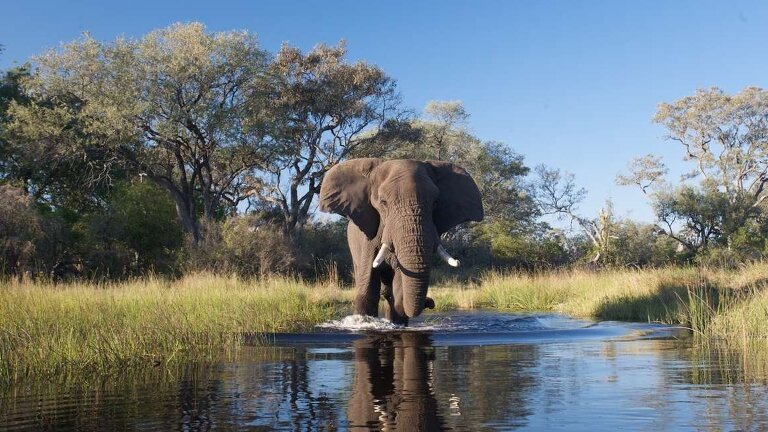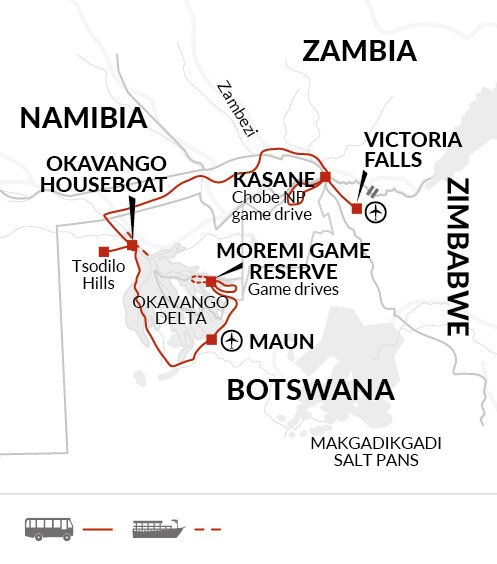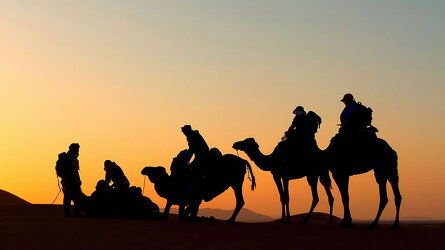Overview
Itinerary
Arrive in Victoria Falls. Often referred to as the adventure capital of Zimbabwe, Victoria Falls offers a variety of land, air and water-based activities in the surrounding area.
For those arriving on time our Leader plans to meet you in the hotel reception at 6pm for the welcome meeting and for those that wish, there is the chance to go out for dinner. There are no other activities planned today, so you are free to arrive in Victoria Falls at any time. If you would like to receive a complimentary airport transfer today, you'll need to arrive into Victoria Falls Airport (airport code VFA), which is 20km, around 25 minutes' drive from the hotel. Should you miss the welcome meeting, your Leader will inform you of any essential information as soon as you catch up.
We will be staying at either the Batonka Guest Lodge or Pioneer Lodge. The two are sister properties located just over 1km from each other and are almost identical. Both are set in beautiful landscaped gardens, feature a swimming pool, spacious rooms, an expansive terrace where breakfast is taken, a bar and a stylish lounge and dining room which are both extremely comfortable. They are both exclusively reserved for residents which ensures the upmost privacy.
If your flight arrives earlier in the day, perhaps you might choose from a host of adventurous activities including whitewater rafting, canoeing and cruises on the Zambezi River. Full details are listed in the 'budgeting and packing' section. Stay: Batonka Guest Lodge (Premium)
Visit one of the natural wonders of the world, Victoria Falls, known locally as The Smoke that Thunders. The Zambezi River plummets over a sheer cliff wall spanning more than 1,600m and drops approximately 100m into the abyss below. Like David Livingstone before us, we become aware of the falls long before we see it. We will view the falls from the Zimbabwean side of the river which incorporates the best views with plumes of water vapour rise like smoke into the sky creating small clouds, all accompanied by a deafening roar. After our guided tour you can take your time to further explore the network of paths and enclaves around the falls.
This afternoon is left free to take advantage of the many activities that Victoria Falls offers including an optional half day game drive into Mosi-oa-Tunya National Park to search for white rhino, trying out whitewater rafting on the Zambezi, enjoying a scenic helicopter flight over the falls or perhaps experiencing a cultural village trip. All activities can be booked at your guesthouse directly and full prices are available in the budgeting section of the trip notes. Stay: Batonka Guest Lodge (Premium) (B)
Leaving our guesthouse this morning, it's a short hour long drive to the Kazungula land border crossing between Zimbabwe and Botswana. Once border formalities are completed, it's a short ten minute drive to our camp site located on the banks of the Chobe River at the point where Zambia, Namibia, Zimbabwe and Botswana meet. Our campsite is located on the waters edge, each tent is built on a fixed platform and has an en-suite bathroom, with sink and flushing WC, there is a separate dining room, bar and lounge area, a good base to explore Chobe National Park.
This afternoon we head out for our first safari on a late afternoon game drive. Chobe is the heart of elephant country and is home to approximately 120,000 of the giant creatures.
During this trip we will travel in customised, open-sided land-cruisers for game viewings or minibus for longer drives. The Landcruisers are perfect for game viewing opportunities but can be a bit brisk and windy during the longer travel days, so ensure you bring some layers for travel days, and your tour leader will provide blankets to make the journeys as comfortable as possible. The roads through Botswana can vary in quality, so travel days can be slow and bumpy but the scenery more than makes up for this. Stay: HATAB Chobe River Camp (Comfortable) (B)
The northern Chobe area of Serondela is the heart of elephant country. Up to 35,000 elephants live here, the largest number in any African park. On our game drive this morning we take a slow drive along the southern bank of the Chobe River, where we can find Chobe Bushbuck and Puku Antelope. The sheer variety of animals in abundance, make this region a must-see for any wildlife enthusiast. We hope to watch huge herds in and around the great Chobe River, which also teems with hippo and crocodile.
This afternoon our mode of transport switches to a boat as we take to the water and view the wildlife from a different perspective. The Chobe River is one of the Zambezi's main tributaries, and home to an abundance of wildlife, as well as a variety of fish including the tiger fish (freshwater barracuda). The area is also famed for its beautiful scenery and magnificent red and gold sunsets. Stay: HATAB Chobe River Camp (Comfortable) (B)
This morning will be a early start for the long journey to Shakawe, located in Botswana's northwest Okavango panhandle. Today's total journey time is approximately seven hours depending on time spent at the two border crossings, and will of course include comfort breaks and a lunch break.
The drive takes us through through Namibia's Caprivi Strip. The Caprivi Region has a colourful and interesting history, playing a central part in the Berlin Conference of 1890. Named after German Chancellor General Count Georg Leo von Caprivi di Caprara di Montecuccoli, the strip was once administered by the British before it was swapped for Zanzibar with the Germans at a time of great European political manoeuvring.
Our destination is our beautiful refurbished houseboat, located on the waters of the Okavango River. We aim to arrive mid afternoon. The mighty Okavango is the third largest river in Africa and its delta area covers 16,000 square kilometres of crystal clear channels, a myriad of ephemeral lakes and ever changing islands. The river flows south east from the Angolan highlands over 1,000 km away, taking up to 6 months to reach the delta area which floods on an annual cycle.
After stocking up on drinks and snacks, we leave our vehicle behind and board a motor launch to our houseboat. On arrival, meet our friendly crew who will be our hosts for the next two nights. After settling in dinner is served in the dining room, with panoramic windows offering the most amazing backdrop of the sun setting over the Okavango river basin.
The accommodation is informal and comfortable, with eight bedrooms with en-suite facilities. Each room has glass doors sliding open on to the wilderness of the remote panhandle area, while on the deck above are seating areas from which to enjoy the sunsets and listen to the birds. The boat will be for our exclusive use during our stay. Stay: Okavango Spirit House Boat (Comfortable) (B/L/D)
During our time on the river, there will be an excellent possibility of seeing game as we cruise past submerging pods of hippos, while crocodiles bask in the shallows and on the riverbanks. Birdlife in the area is prolific and local fishermen are often seen aboard their traditional dugout canoes, known locally as mokoros.
We include boat trips on a motorized launch to experience the areas of the Delta that are harder to reach, cruising into channels where hippos and crocodiles are usually sighted. We return to our houseboat in the golden light of the late afternoon where we can enjoy a traditional 'sundowner' relaxing in the open plan lounge. This is a home away from home, where you can enjoy the surroundings of this stunning part of Southern Africa. Stay: Okavango Spirit House Boat (Comfortable) (B/L/D)
Leaving our houseboat this morning, we make our way to the intriguing Tsodilo Hills. The San Bushmen believe that this was the site of the first creation and so it is considered a holy and sacred place. The area has an astonishing 3,500 rock paintings over 350 different sites which all celebrate this event. There are four mountains that jut out of the expanse of the surrounding land and the San Bushmen believe that the bigger rock, the male, has a wife and child, but that he left his wife for a younger wife who now lingers in the background. A expert local guide will accompany us around the site, interpreting the carvings. The walking tour lasts around two hours, walking along a flat well graded path. It's possible to opt out at any stage and return to the shade of the small museum located at the entrance of the site, where we will also have an early picnic lunch.
After our visit here we drive to the town of Maun, located on the southern reaches of the Okavango Delta and the gateway to the Moremi Game Reserve. In 2023 we use two different properties, the magnificent Thamo Telele is set amongst a lush forest of old growth leadwood and acacia trees, around 25 minutes outside of Maun, each luxury safari-style tent is on raised wooden platforms with hardwood floors and en-suite bathrooms, all with outdoor showers and nature as the back drop. The stylish canvas tents all have twin beds, which can be converted into doubles, and air conditioning above the bed. There is a swimming pool and central main lounge and bar area, where you'll find comfy couches and locally designed wall art. Its a truly exceptional property - but will only be used on selected 2023 departures. The other property we use is the Island Safari Lodge which is located in Maun itself. Your confirmation documents will highlight which property you are saying at. Stay: Island Safari Lodge (Comfortable) (B/L)
Today we take a drive out of Maun to Xakanaxa (pronounced ka-ka-ni-ka) or Khwai which is an integral part of the eastern waters of the Okavango Delta. The area is encompassed by Moremi Game Reserve and boasts some of the best game viewing in Africa. The game reserve has areas of dry lands rising between vast wetlands, crystal clear water channels on the edges of Mopane and Apple-Leaf woodlands. Game viewing takes place alongside waterways and floodplains.
Species such as Giraffe, Zebra and Wildebeest are but a few that occur here, along with an astonishing variety of birds. For the next three nights we will be camping in Moremi where the waters feed an abundance of flora and fauna, including the frequently-visiting wild dog. Hippos are often heard by night too. We should see a good amount of game heading to our campsite; in the late afternoon we head of for a further game drive.
Safari wild camping
We use 3 x 3 meter dome type tents with private en-suite facilities added to the back of the tent. They are big enough so that someone can stand inside. These tents are made from durable rip-stop canvas and have sewn-in groundsheets. They come equipped with sturdy camp beds, mattresses, fitted sheets, pillow, pillowcases and duvets. Other equipment used on safari are camping basins, washstands, hot water bucket showers and a portable toilet. Safari style fold-up chairs and large tables are provided (all meals eaten from the table). Our great back-up staff does all the cooking, cleaning and setting-up and breaking camp, so the difficult aspect of camping is taken away. This setup allows us to get as close to nature, wilderness, plants and animals as possible. Stay: DWNP Public Campsite (Simple) (B/L/D)
We will enjoy two game drives today. Setting off for our morning game drive at first light (when predator activity is most expected), we get the chance to experience one of Africa's most natural and unspoiled wonderlands in the park with hippo, crocodile and a great variety of birds all seen in the Delta, as well as the elusive sitatunga antelope. This place is also an ornithologist's paradise with fish eagle, kingfisher, heron, stork, egret, weaver and bee-eater all regularly seen.
Returning for brunch as the day starts heats up, the hottest part of the day is spent at leisure at our camp site, a chance of a siesta, relax reading a book or birdwatching. Our afternoon activity departs after tea, usually around 4pm, to return in the early evening. Game drives and activities vary from one to the next, depending on sightings and animal activities, generally, we drive quite far and slowly to absolutely maximize game-viewing potential, all expertly guided by our highly experienced tour leaders. Stay: DWNP Public Campsite (Simple) (B/L/D)
We spend our time on game drives in search of the wildlife of the region, with the larger mammals like elephant, giraffe and zebra being spotted on the flood plains as well as predators such as lion, leopard and wild dog. Stay: DWNP Public Campsite (Simple) (B/L/D)
We take a leisurely drive back to Maun with the afternoon free for optional activities or just to relax at our hotel and make use of the swimming pool. Stay: Island Safari Lodge (Comfortable) (B/D)
The trip ends after breakfast at our hotel in Maun.
There are no activities planned today, so you are free to depart from Maun at any time. If your flight is departing later in the day luggage storage facilities are available at our hotel. If you would like to receive a complimentary airport transfer today, you need to depart from Maun International airport (airport code MUB), which is 10km, 15 minutes from the hotel. (B)
Trip Inclusions
- Discover the game-rich wildlife of Moremi and get up close with Chobe's large herds of elephant
- Explore the waterways of the Okavango Delta from the comfort of a houseboat
- Witness the majestic and powerful Victoria Falls, one of the natural wonders of the World
- Moderate pace tours are ideal if you want a holiday which combines exciting activities and experiences with plenty of time to relax and unwind. Typically you'll be active and busy for part of the day but then also have time to rest and recharge your batteries.
- Accommodation, itinerary and inclusions subject to change.
- Price is for land, cruise and internal flights as specified. Flights not specified are not included
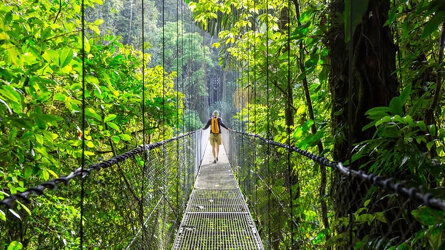
Launching in 1981, Explore offer classic small group and private adventures to over 130 countries. Read more
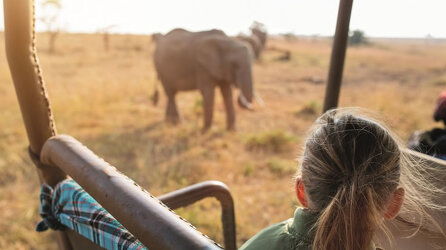
You won't find any 40-seater tourist coaches on an Explore family adventure holiday. To ensure you get the most out of your trip Explore keep group sizes small. Read more
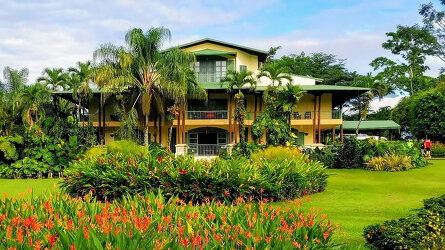
The places Explore stay are every bit as important as the sights they visit and the things you do. Read more
Brochure
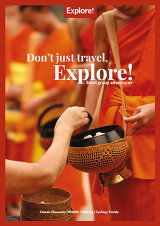
Explore Small Group Adventures (2024-25)
Availability
A definite departure means minimum numbers have been reached for this departure to operate. Your Global Journeys Travel Advisor will check the availability of your departure date when you enquire. Additional savings may apply. We guarantee the lowest price in Australia. T&C’s apply.
Tour & cruises prices are per person. Prices shown have savings applied, are subject to availability and may be withdrawn at any time without notice. Pricing and trip details are correct at this point in time, however are subject to confirmation at the time of booking and are subject to change by Explore. For cruise itineraries, cabin images are sourced from Explore. These should be treated as indicative only. Cabin inclusions, upholsteries and room layout may differ to the image(s) shown depending on the ship selected and your sailing dates.
